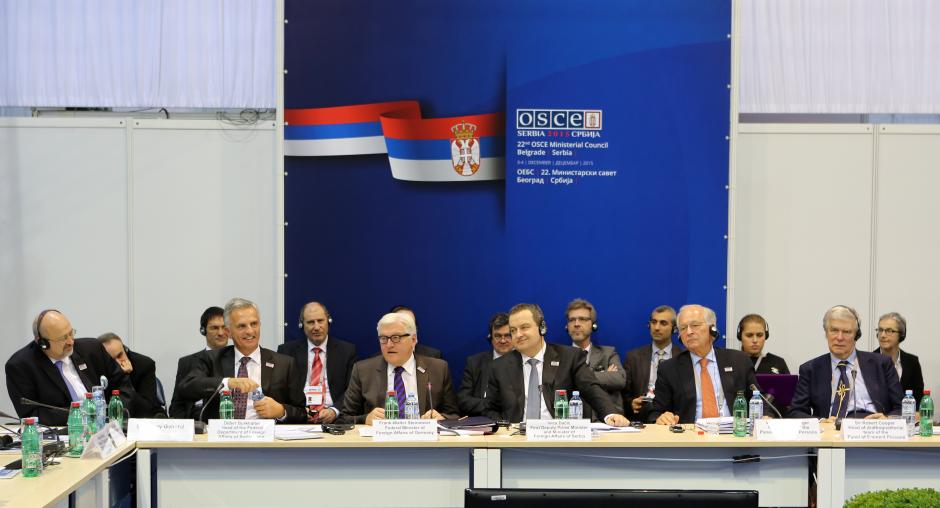OSCE Troika Ministers discuss Panel of Eminent Persons’ final report

The conclusions of the final report of the Panel of Eminent Persons on European Security as a Common Project were discussed at a side event on the margins of the 22nd OSCE Ministerial Council in Belgrade on 3 December 2015. Speakers included all three OSCE Troika Foreign Ministers as well as representatives of OSCE Delegations in Vienna and the OSCE Network of Think Tanks and Academic Institutions.
The report, Back to Diplomacy, was launched earlier in the day and was also discussed at the informal Ministerial luncheon, which brought together over 40 Foreign Ministers from the OSCE area. The report offers recommendations for reconsolidating European security against the backdrop of the crisis in and around Ukraine. It highlights the need for more effective measures to reduce the risk of military accidents or incidents, and calls for full implementation of the Minsk agreements and the creation of an international Ukraine Contact Group. The report’s central recommendation is for a robust diplomatic process that would rebuild the foundation of European security.
The Foreign Ministers of the OSCE Troika representing the current, former and incoming Chairpersons-in-Office: Serbia’s Ivica Dačić, Switzerland’s Didier Burkhalter and Germany’s Frank-Walter Steinmeier, respectively - endorsed the report, noting that it represents an important contribution to a debate about the future of European security and deserves close examination. According to the Ministers, it is now up to participating States to decide how to best follow up on the Panel’s recommendations.
Dačić said that in these challenging times for the security in the common European space, there is need to reaffirm, strengthen and safeguard the founding principles of the OSCE as laid down in the Helsinki Final Act.
“We must revive ‘the spirit of Helsinki’ if we want to resolve our differences in a co-operative rather than a confrontational way,” said Dačić.
Wolfgang Ischinger, Chairperson of the Panel of Eminent Persons and of the Munich Security Conference, noted that the report does not propose new principles or new institutions to address the current security challenges in Europe and in the wider OSCE area but underlines a need to make better use of existing instruments.
“We have many agreed principles though we do not always respect them; and we have common institutions though sometimes we seem determined to prevent them from working,” Ischinger said, adding that there is a need to return to a robust diplomatic process and to explore common problems of European security in a careful, confidential and systematic way.
“If the Finnish initiative of the 1970s could lead to the Helsinki Final Act in the midst of the Cold War, there is no reason to believe that such an approach cannot succeed forty years later. It would be negligent not to try. It was a courageous step, and we need such courageous steps again – today more than ever,” Ischinger said.
Robert Cooper, a lead drafter of the final report added, “While the vision of a common European home may be more remote today than it appeared two decades ago, we still occupy a common space and need to find ways of living together in it.”
Comments on the final report were also offered by Katja Pehrman, Permanent Representative of Finland to the OSCE; Isabelle Poupart, Permanent Representative of Canada to the OSCE; and Christian Strohal, Permanent Representative of Austria to the OSCE.
The OSCE Network of Think Tanks and Academic Institutions was represented by Wolfgang Zellner, Head of the Centre for OSCE Research at the University of Hamburg, and Sonja Stojanovic Gajic, Director of Belgrade Centre for Security Policy.
The event was moderated by Fred Tanner, Senior Adviser to the OSCE Secretary General.
In line with the Panel’s mandate, several outreach activities are foreseen for the first half of 2016.
